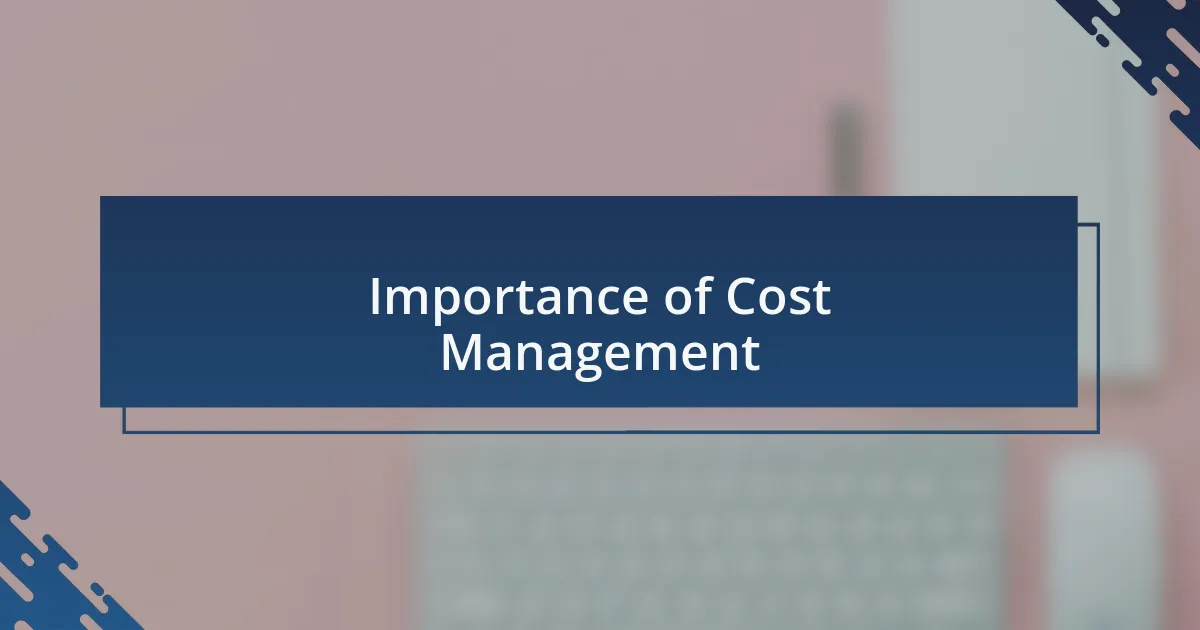Key takeaways:
- High-Performance Computing (HPC) has the potential to solve critical global issues by revolutionizing fields like medicine and engineering.
- Effective cost management is essential in HPC to avoid budget overruns and ensure efficient resource use, enabling teams to innovate without financial strain.
- Common cost challenges in HPC include unpredictable usage patterns, confusing pricing models, and resource over-provisioning, all requiring strategic balance.
- Implementing strategies such as autoscaling, continuous monitoring of usage, and utilizing spot instances can lead to significant cost savings in cloud HPC.

Understanding High-Performance Computing
High-Performance Computing (HPC) refers to the use of supercomputers and advanced algorithms to solve complex problems at incredible speeds. I remember attending a conference where a researcher shared how HPC enabled them to model climate change scenarios in real-time, which was both fascinating and alarming. It made me realize the enormous potential of HPC in tackling critical global issues.
When I think about the sheer power of HPC, I often wonder how it can revolutionize fields like medicine and engineering. For example, it’s used to simulate drug interactions in molecular biology, potentially speeding up the discovery of life-saving medications. Can you imagine a world where HPC could lead to breakthroughs in diseases we’ve struggled to understand for decades? The promise is substantial.
Moreover, the collaborative nature of HPC can sometimes feel overwhelming yet exhilarating. During a collaborative project I was part of, we combined expertise from different fields, allowing us to achieve results we never thought were possible. Just reflecting on those experiences drives home the idea that the future of HPC isn’t just about faster computing; it’s about harnessing collective knowledge to solve significant challenges.

Importance of Cost Management
Effective cost management in cloud HPC is crucial for ensuring that resources are used efficiently. I recall a project where we underestimated the expenses associated with our compute time, leading to a significant budget overrun. This experience taught me that not keeping a close eye on costs can derail even the most promising research initiatives.
When teams don’t prioritize cost management, they risk not only financial strain but also limiting their ability to innovate. I’ve seen colleagues in awe as they unlocked new insights, yet they faced the harsh reality of needing to scale back due to unanticipated expenses. Isn’t it disheartening to think that a lack of planning might hinder groundbreaking discoveries in high-performance computing?
Moreover, by actively managing costs, teams can reinvest savings into other vital areas, such as training or expanding capabilities. I often think about how a tight budget can lead to creative solutions. For instance, we developed a streamlined workflow that not only cut costs but also increased the pace of our research. It’s fascinating how, through strategic financial management, we can overcome barriers and enhance our impact in the HPC landscape.

Common Cost Challenges in HPC
One of the most prevalent cost challenges in HPC that I’ve observed is the unpredictable nature of usage patterns. For example, during a surge of data processing, I once experienced an overwhelming spike in compute usage that far exceeded our initial projections. It left me wondering how many teams are facing similar surprises, scrambling to manage costs when demand suddenly outpaces expectations.
Additionally, the complexity of pricing models can create confusion. There was a time when I meticulously planned our budget based on estimates, only to find hidden fees for storage and data transfer that quickly added up. I realized that understanding the fine print is essential; otherwise, we might end up playing a costly guessing game. Could better transparency in pricing help prevent such situations?
Finally, resource allocation itself can be a double-edged sword. I’ve seen teams allocate significant budget toward high-performance nodes, but they often end up underutilizing them. This realm of over-provisioning can lead to wasted investments that could have been better spent elsewhere. It begs the question: how can we strike the right balance between performance and cost efficiency?

Strategies for Effective Cost Control
When it comes to managing costs effectively in cloud HPC, one strategy I’ve found invaluable is implementing resource autoscaling. Just last year, during a major project, we experienced fluctuating workloads that made manual adjustments overwhelming. By enabling autoscaling based on real-time demand, I saw not only a reduction in unnecessary expenditure but also a smoother operation overall. This approach raises an important question: How can flexibility in resource allocation create significant savings in your own projects?
Another tactic that has been tremendously beneficial involves continual monitoring of usage patterns. I’ve often felt a bit anxious before diving into this step, as it requires diligence and commitment. However, tracking consumption consistently allowed me to identify trends that helped forecast future needs. For instance, after a few months of data collection, I discovered that certain nodes were rarely used, prompting a reevaluation of our resources. Have you considered how analysis of historical data could refine your cost management strategy?
Lastly, I highly recommend embracing spot instances for non-essential workloads. In my past experience, I hesitated to utilize this cost-saving option due to concerns about job interruptions. But once I took the leap, the savings were remarkable, allowing us to allocate funds toward critical tasks. It makes me wonder: are we limiting ourselves by sticking only to on-demand instances when there are more flexible solutions available?

Personal Experiences with HPC Expenses
Managing expenses in cloud HPC can feel like navigating a minefield. I remember one particular project that pushed our budget to the limit. We were excited about the potential but realized, midway through, that the costs were piling up faster than expected. Reflecting on that experience taught me the value of budgeting and upfront cost estimation. How often do we dive headfirst into a project without thoroughly understanding the financial implications?
On a different note, I’ve encountered the frustration of unexpected charges after a seemingly routine month of calculations. I vividly recall a surprise bill that arrived due to a minor misconfiguration in our cloud setup. This incident underscored for me how crucial it is to keep communication lines open with both the team and the cloud provider. Shouldn’t we all strive for clarity to avoid such unpleasant surprises in our financial planning?
Then there are the times where I underestimated the impact of storage costs. I’ve learned the hard way that not all data needs to be kept indefinitely. Recently, I initiated an archival process that helped us sift through old datasets, saving us a significant amount on storage fees. The reassurance that came from that decision made me ponder: how many of us are holding onto unnecessary data simply because it’s easier than deciding what to discard?